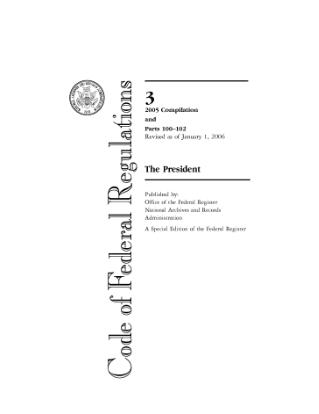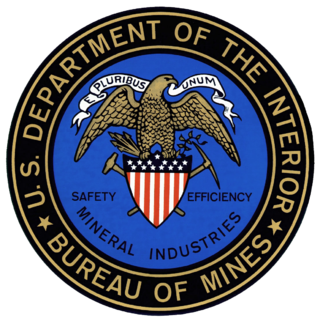See also
- NIOSH air filtration rating - 30 CFR 11 (now removed)
CFR Title 30 - Mineral Resources is one of fifty titles comprising the United States Code of Federal Regulations (CFR), containing the principal set of rules and regulations issued by federal agencies regarding national mineral resources. It is available in digital and printed form, and can be referenced online using the Electronic Code of Federal Regulations (e-CFR).
30 CFR Part 11 regulations for respirators have been moved to Title 42, Part 84. [1]
The table of contents, as reflected in the e-CFR updated February 28, 2014, is as follows: [2]
| Volume | Chapter | Parts | Regulatory Entity |
|---|---|---|---|
| 1 | I | 1-199 | Mine Safety and Health Administration, Department of Labor |
| 2 | II | 200-299 | Bureau of Safety and Environmental Enforcement, Department of the Interior |
| IV | 400-499 | Geological Survey, Department of the Interior | |
| V | 500-599 | Bureau of Ocean Energy Management, Department of the Interior | |
| 3 | VII | 700-999 | Office of Surface Mining Reclamation and Enforcement, Department of the Interior |
| XII | 1200-1299 | Office of Natural Resources Revenue, Department of the Interior |

In the law of the United States, the Code of Federal Regulations (CFR) is the codification of the general and permanent regulations promulgated by the executive departments and agencies of the federal government of the United States. The CFR is divided into 50 titles that represent broad areas subject to federal regulation.

The Federal Register is the official journal of the federal government of the United States that contains government agency rules, proposed rules, and public notices. It is published every weekday, except on federal holidays. The final rules promulgated by a federal agency and published in the Federal Register are ultimately reorganized by topic or subject matter and codified in the Code of Federal Regulations (CFR), which is updated quarterly.

The Resource Conservation and Recovery Act (RCRA), enacted in 1976, is the primary federal law in the United States governing the disposal of solid waste and hazardous waste.

For most of the 20th century, the United States Bureau of Mines (USBM) was the primary United States government agency conducting scientific research and disseminating information on the extraction, processing, use, and conservation of mineral resources. The Bureau was abolished in 1996.

The Mine Safety and Health Administration (MSHA) is a large agency of the United States Department of Labor which administers the provisions of the Federal Mine Safety and Health Act of 1977 to enforce compliance with mandatory safety and health standards as a means to eliminate fatal accidents, to reduce the frequency and severity of nonfatal accidents, to minimize health hazards, and to promote improved safety and health conditions in the nation's mines. MSHA carries out the mandates of the Mine Act at all mining and mineral processing operations in the United States, regardless of size, number of employees, commodity mined, or method of extraction. David Zatezalo was sworn in as Assistant Secretary of Labor for Mine Safety and Health, and head of MSHA, on November 30, 2017. He served until January 20, 2021. Jeannette Galanais served as Acting Assistant Secretary by President Joe Biden on February 1, 2021 until Christopher Williamson took office on April 11, 2022.

The Federal Maritime Commission (FMC) is an independent agency of the United States government that regulates U.S. oceanborne transportation and the United States Merchant Marine. It is chaired by Daniel B. Maffei.
Title 21 is the portion of the Code of Federal Regulations that governs food and drugs within the United States for the Food and Drug Administration (FDA), the Drug Enforcement Administration (DEA), and the Office of National Drug Control Policy (ONDCP).
In the United States, public drinking water is governed by the laws and regulations enacted by the federal and state governments. Certain ordinances may also be created at a more local level. The Safe Drinking Water Act (SDWA) is the principal federal law. The SDWA authorizes the United States Environmental Protection Agency (EPA) to create and enforce regulations to achieve the SDWA goals.

The Mining Enforcement and Safety Administration (MESA) under the U.S. Department of the Interior was the predecessor of the Mine Safety and Health Administration, prior to March 9, 1978. It was formed by the Federal Coal Mine Health and Safety Act of 1969, and co-approved respirators with NIOSH under 30 CFR Part 11. It was dissolved and replaced with MSHA following the passage of the Federal Mine Safety and Health Act of 1977.
The Common Rule is a 1991 rule of ethics in the United States regarding biomedical and behavioral research involving human subjects. A significant revision became effective July 2018. It governed Institutional Review Boards for oversight of human research and followed the 1975 revision of the Declaration of Helsinki; it is encapsulated in the 1991 revision to the U.S. Department of Health and Human Services Title 45 CFR 46 Subparts A, B, C and D. Subpart A. The Common Rule is the baseline standard of ethics by which any government-funded research in the US is held; nearly all U.S. academic institutions hold their researchers to these statements of rights regardless of funding.
Treasury Regulations are the tax regulations issued by the United States Internal Revenue Service (IRS), a bureau of the United States Department of the Treasury. These regulations are the Treasury Department's official interpretations of the Internal Revenue Code and are one source of U.S. federal income tax law.

The Clean Air Act (CAA) is the United States' primary federal air quality law, intended to reduce and control air pollution nationwide. Initially enacted in 1963 and amended many times since, it is one of the United States' first and most influential modern environmental laws.
Title 1 of the Code of Federal Regulations, titled General Provisions, is a United States federal government regulation.
CFR Title 49 - Transportation is one of fifty titles comprising the United States Code of Federal Regulations (CFR). Title 49 is the principal set of rules and regulations issued by the Departments of Transportation and Homeland Security, federal agencies of the United States regarding transportation and transportation-related security. This title is available in digital and printed form, and can be referenced online using the Electronic Code of Federal Regulations (e-CFR).
CFR Title 42 - Public Health is one of fifty titles comprising the United States Code of Federal Regulations (CFR). Title 42 is the principal set of rules and regulations issued by federal agencies of the United States regarding public health, including respirator rules and regulations moved from CFR Title 30, to the Public Health Service.
CFR Title 18 – Conservation of Power and Water Resources is one of 50 titles composing the United States Code of Federal Regulations (CFR) and contains the principal set of rules and regulations issued by federal agencies regarding the conservation of power and water resources. It is available in digital and printed form and can be referenced online using the Electronic Code of Federal Regulations (e-CFR).
CFR Title 9 – Animals and Animal Products is one of 50 titles composing the United States Code of Federal Regulations (CFR) and contains the principal set of rules and regulations issued by federal agencies regarding animals and animal products. It is available in digital and printed form and can be referenced online using the Electronic Code of Federal Regulations (e-CFR).
CFR Title 5 – Administrative Personnel is one of fifty titles comprising the United States Code of Federal Regulations (CFR), containing the principal set of rules and regulations issued by federal agencies regarding administrative personnel. It is available in digital and printed form, and can be referenced online using the Electronic Code of Federal Regulations (e-CFR).

The NIOSH air filtration rating is the U.S. National Institute for Occupational Safety and Health (NIOSH)'s classification of filtering respirators. The ratings describe the ability of the device to protect the wearer from solid and liquid particulates in the air. The certification and approval process for respiratory protective devices is governed by Part 84 of Title 42 of the Code of Federal Regulations. Respiratory protective devices so classified include air-purifying respirators (APR) such as filtering facepiece respirators and chemical protective cartridges that have incorporated particulate filter elements.
A Title 42 appointment is an excepted service employment category in the United States federal civil service. It allows scientists and special consultants to be hired as part of the Public Health Service or Environmental Protection Agency under a streamlined process "without regard to the civil-service laws". Courts have ruled that, although Title 42 appointments are exempt from hiring and compensation provisions of civil service laws, they are still entitled to protections relating to termination, including appeals to the Merit Systems Protection Board.